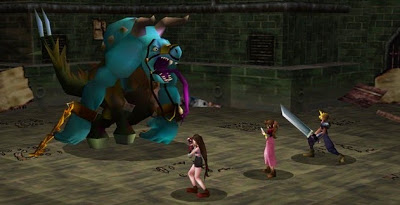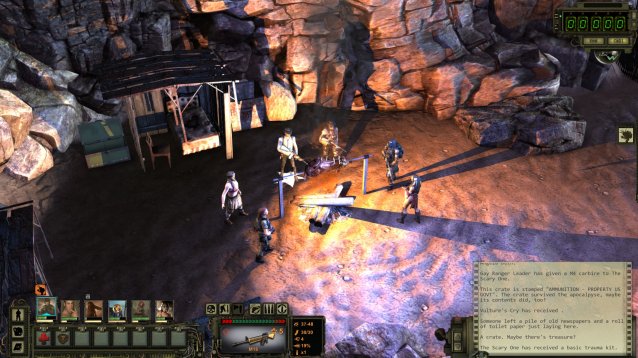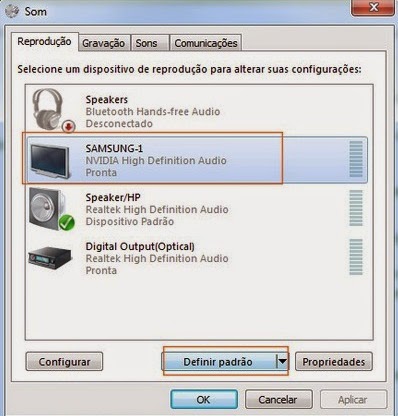

Even though it’s the fifth of the series, Virtua Tennis 4 is - for better or worse depending on your affection for Sega’s tennis games - still very much what we remember playing in the arcade ten years ago. It relies on simple, arcadey mechanics rather than the simulation-based play 2K’s Top Spin series is famous for. In fact, you only really need four buttons (up from VT2009’s three!), a joystick, and a basic understanding of geometry to feel like a master. It’s a system that has transcended the sport, appealing even to those out there who think Federer is that guy who played for the Red Wings. That’s all well and good, but fans are eventually going to start expecting new and exciting things. Too bad VT4 isn’t different enough to warrant a purchase, and due to its slower and less responsive gameplay, actually causes us to worry about where the franchise is headed.
As we touched on before, newcomers will have no trouble learning the swing of things. Aside from the use of the dedicated topspin, slice, and lob buttons, the key to victory lies in moving your player to the right spot in order maximize your power and outmaneuver your opponent. New to VT4 is the Super Shot, a reward for filling a meter at the top of the screen with play that matches your character’s style. Once your meter is full, pressing B will allow you to hit a power shot from any position in the court. It’s a fun tool, but ultimately useless, as the meter fills way to slowly to be a determining factor in any match.
The world tour mode has been revamped again, though less because Sega had a brilliant new idea and more because the developer has never been able to create a career mode worth keeping. That trend continues here with a nonsensical board game format, where you draw from three randomly numbered “move tickets” to determine how many spaces you’ll advance that day. Sometimes you’ll land on one of the wacky minigame training sessions that the Virtua Tennis series is known for. Other times you’ll land on a practice match or a big tournament. And every so often you’ll land on an uh-oh spot that forces you to drop your wallet and lose half your earnings. The point is to move all the way around the world as you train, play tournaments, and work your way to number one. But the ticket system causes you to miss crucial tournaments and training sessions, leaving you unprepared when the majors roll around.
Wacky layouts aside, the biggest issues we had were with the gameplay mechanics. Having just recently replayed a bit of Virtua Tennis 3 and Virtua Tennis 2009 for comparison’s sake, we found Virtua Tennis 4 to be slower, less precise, and less responsive. More than in past games, your pace of shot relies on you getting into position and charging (holding) the shot button and the directional input to determine how hard and how angled your shot will be. In fact, no matter how long you hold a directional input, you will never get the same angles you could in past games. As a result of these things, and the fact that your player moves more slowly than ever, it can be nearly impossible to turn the tables on a rally if you’re on defense.
On-screen player reaction speed has also been reduced. This means that no matter how quickly you react with button presses, your player will have trouble pulling off those last-minute saves or reflex volleys. And much like the groundstrokes, volleys don’t have much stick unless you charge them - which as anyone who’s played tennis will know, makes little sense.
The last nagging issue is the discretionary self-movement of your character. You’ll often see oddities like Federer automatically running around his forehand to hit a backhand, or players moving forward that hit a weak half-volley on a ball that you would normally crush at waist level. If you didn’t understand any of the last sentence then you may not be that phased by the changes. But it’s definitely something to consider for anyone who’s played tennis before (real or Virtua).
Online mode returns with a new and improved matchmaking system. Instead of staring at the screen while you wait for an opponent, the game allows you to run through arcade mode as it searches for a match. Once a match is found, your arcade game will be interrupted and the online game will begin. This is a great system, but once your online match is over you can’t pick up exactly where you left off in arcade mode. You’ll have to start the round over.
Connections were generally good and there weren’t too many dropped matches or lag issues during our sessions. However there were a few online-only problems that presented themselves. The serve meter during online play is broken: your input is always significantly delayed making a max serve nearly impossible to pull off. You’ll also be forced to watch a replay after every point - an inconvenience that will wear heavily on your patience if you plan on spending the majority of your time online.
Where you won’t be spending much of your time is in front of your Kinect, waving your empty hands around like you’re giving a drunken, impromptu tennis lesson at a party. All court movement is automatic, leaving only the swinging of the invisible racquet up to the player. Kinect will recognize topspin and slice motions from upward or downward flailing respectively, and the direction in which you end up hitting the ball is dependent on how early or late your swing is. Given the small amount of lag the Kinect has by default, this all feels very unnatural. And since you don’t have full access to all facets of gameplay while using Kinect, only two modes are available - exhibition and party mode (minigames).
At its core, Virtua Tennis 4 remains a game that can be casually enjoyed by anyone, but for the more serious tennis crowd, it feels outdated and even unresponsive at times. Here’s hoping Sega goes back to the drawing board, because a slightly updated roster and tacked-on motion controls aren’t nearly enough to revitalize this established series.
May 18, 2011




 Not Funny! - How Not Every Part of GTA5s Satire Works Quite So Flawlessly
Not Funny! - How Not Every Part of GTA5s Satire Works Quite So Flawlessly How to get Deus Ex: Human Revolution all Four Endings in one playthrough
How to get Deus Ex: Human Revolution all Four Endings in one playthrough The Broken Straight Sword can be the best weapon in Dark Souls 2
The Broken Straight Sword can be the best weapon in Dark Souls 2 ctOS Mobile App Challenges and Tactics
ctOS Mobile App Challenges and Tactics HDMI: Fix sound problems - Set the audio after connecting PC to TV
HDMI: Fix sound problems - Set the audio after connecting PC to TV